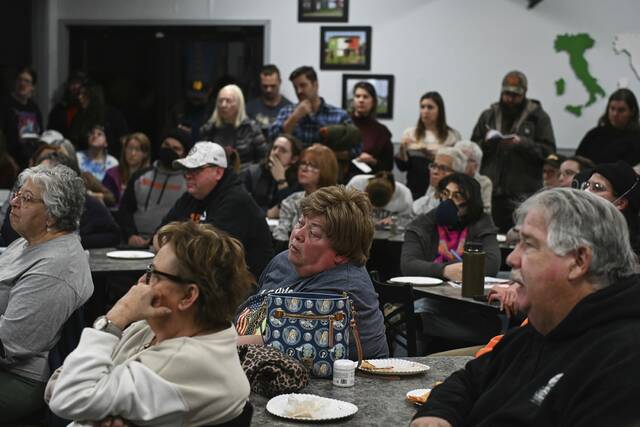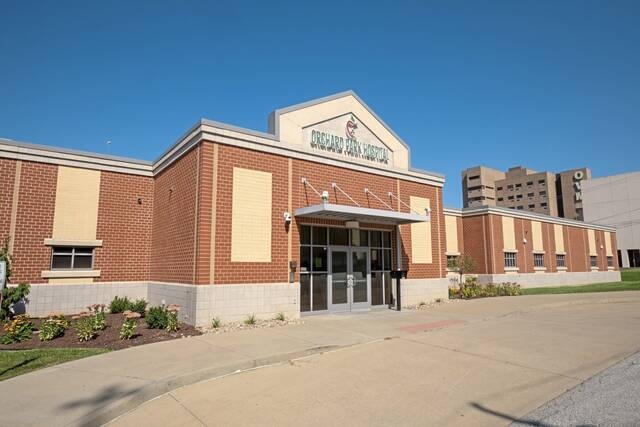A socially distanced sea of more than 1,000 people is expected to walk along the Monongahela riverfront Saturday morning motivated by a shared goal — supporting those affected by Alzheimer’s disease and the researchers striving to cure it.
The crowd of fundraisers will march a roughly two-mile loop from Highmark Stadium at Station Square to shortly past the Smithfield Street Bridge and back again.
The Pittsburgh Walk to End Alzheimer’s is headed back to the South Shore after going virtual during last year’s pandemic-spurred restrictions.
“We’re already exceeding numbers from 2020, so we’re really excited to be back in person this year,” said Meg Dluhos, walk manager for the Alzheimer’s Association Greater Pennsylvania Chapter. “Our walk community is really excited to be feel that energy again and to be able to honor and recognize all those we have lost in the past couple of years.”
Combined with similar events by chapters around the United States, the annual fundraiser is billed by organizers as the “world’s largest event dedicated to Alzheimer’s care, support and research.”
The local event’s 100 to 150 volunteers will be masked up and wearing gloves, and hand-washing stations will be on hand for participants, who have been asked to wear masks if they are unvaccinated.
“We’ll strongly encourage our teams and our participants to socially distance as they walk the path,” Dluhos said. “We’ll have a staggered start, plenty of room for people to spread out to keep safe.”
By early Monday, the 2021 Pittsburgh Walk had raised nearly $330,000 — approaching 77% of this year’s $425,000 goal.
Where does the money go?
Walkers registered for this weekend’s walk hail from across Western Pennsylvania and beyond, including neighboring states such as West Virginia and Ohio and family members of locals traveling from as far as California.
At least three local individuals each have raised more than $5,000, with the lead fundraiser bringing in more than $10,000. The more than 230 teams of participants range from pairs to teams of more than 100 people.
The Chicago-based Alzheimer’s Association, which reported nearly $400 million in 2020 revenue, said it spends 78% of all money generated to go toward “care, support, research, awareness and advocacy activities.”
The rest of the donations and income get split between fundraising costs (18%) and administrative expenses (4%), according to the association and Internal Revenue Service records.
Money raised will go to the local chapter for the likes of support groups and resources for dementia patients and caregivers, as well as toward the latest research and clinical trials.
Supporters are energized by advances such as the Food and Drug Administration’s approval of the first drug that could potentially slow the progression of Alzheimer’s disease as opposed to merely treating its increasingly debilitating symptoms.
“This recent medication breakthrough is the first progress we’ve seen in a long time, and we’re putting a lot of our funds toward research in order to make bigger steps, to find that cure,” Dluhos said.
RELATED: What Western Pa. doctors are saying about controversial Alzheimer’s drug
Long-term care joining in
Several nursing homes and other long-term care partners in the region are expressing solidarity by doing their own events. Places such as Friendship Village of South Hills retirement community in Upper St. Clair are planning walks that will happen at the same time as the main event. Others have helped raise money and plan their small walks on various days this month.
“It’s just been so challenging, not only for the workers but also for the residents and for their families who can’t come in and see their loved ones,” Dluhos said. “It’s been a really difficult couple of years, so we are hoping that this provides some hope and joy in their lives.”
“While they might not feel comfortable coming in person because of the risk of covid still, they’re doing walks around their own campuses, so we’ve been dropping off our flowers and materials to help them do little walks within their own communities and just give their residents something to look forward to.”
More than 6 million Americans are living with Alzheimer’s disease – a leading cause of death in the United States – and experts estimate there are far more living with dementia who are undiagnosed.
In Pennsylvania, more than 280,000 people are living with the disease with support from more than 500,000 caregivers.
“Early diagnosis can make all the difference in the world,” Dluhos said. “It’s not a comfortable conversation. A lot of people don’t want to talk about it in the workplace or even with their families … It can be really difficult to admit that you’re having symptoms.”
Carrying flowers with meaning
The event begins with a “Promise Garden” ceremony, during which instead of live speakers there will be a pre-recorded video presentation of local people sharing their stories about how Alzheimer’s disease has affected them and their loved ones.
Each participant receives an artificial oversized flower to carry. Each flower’s color has meaning.
A blue flower is waved by those who are living with Alzheimer’s disease or another form of dementia, and yellow signifies a caregiver or family member.
Purple petals are hoisted by far those who have lost a loved one.
All other supporters of the cause carry orange flowers to represent the “vision of a world without Alzheimer’s and all other dementia.”
“It’s just such a beautiful and important part of our walk,” Dluhos said. “To see all of our participants raise their flowers in honor of those that they know and their loved ones who have had Alzheimer’s or other dementias, it really brings it home. It brings it all home as to why we walk and why we fight against this disease.”
Registration begins at 8 a.m. Saturday at Highmark Stadium at 510 W. Station Square Dr. Donations also can be accepted/collected through Dec. 3.
To register or learn more about the Pittsburgh Walk to End Alzheimer’s, go to alz.org/walk.











